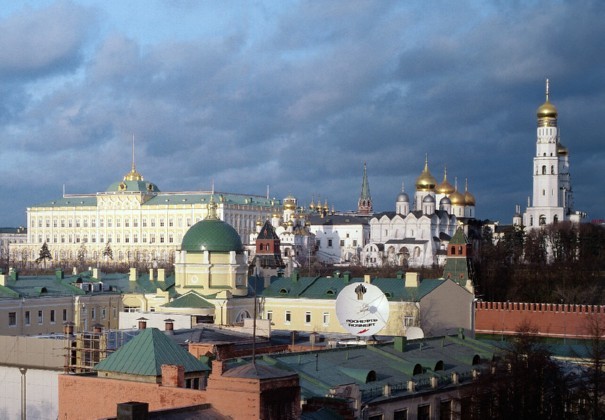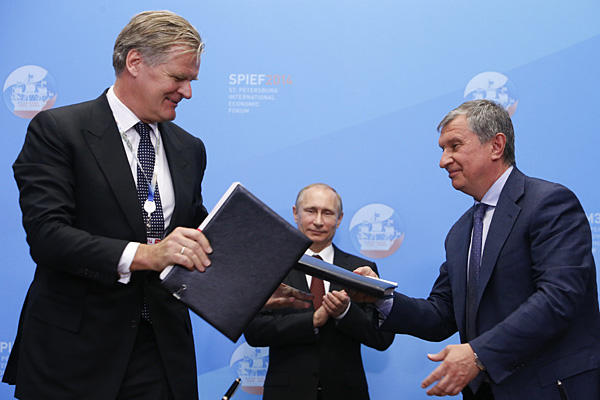Business is business. Western duplicity towards Russia.
In
Log in if you are already registered

Rosneft Headquarter in Moscow. Behind, the Kremlin.
Despite the sanctions issued by the United States and the European Union against russian politicians and businessmen and despite the neverending discussion about the need for diversification in the european energy market, many western oil companies are acting just the opposite of how expected.

from the left: Bp CEO Bob Dudley, Vladimir Putin, Igor Sechin in St Petersburg
One of the latest stories on the news was the billion-dollars contract signed by BP (British Petroleum) with Rosneft, Russia’s main state-owned oil company. The deal, which was closed on 27th of June, follows a previous one closed in May about the exploration of unconventional oil in the Volga-Urals region. Furthermore, BP holds a 19.75% share of Rosneft, a double commitment as both partner and stakeholder towards the russian giant that doesn’t match very well with the political hardline endorsed by Downing Street. The british Prime Minister Cameron has been one of the most virulent callers for action in Ukraine, and has threatened unilateral sanctions against Russia more than once. Yet, instead of scaling back its engagement BP, which is state-owned, is going to import from Russia 12 million tons of refined oil products* per year with a prepayment of almost 1.5 billions, as agreed in the last deal. At the meeting arranged in London was also present Igor Sechin, current president of Rosneft and one of Putin’s closest friends, recently hit by american sanctions. "I am working here with Rosneft. It's a business between the companies. I don't comment on personal sanctions," said BP CEO Bob Dudley when asked about Sechin’s status. In other words: business is business, no matter what. This is not the first time that Britain records a divergency between diplomacy and business affairs. In 2012, when the EU issued an oil embargo against Iran, Bp was the only company granted a special permission to continue drilling on persian soil.
Back to the crisis in Ukraine, France has behaved in similar ways. Total, the main state-owned hydrocarbons company, signed a contract with LUKoil, the major russian private oil company, in the mid of the turmoil in East Ukraine. The deal has the goal of exploiting tight oil in the Bazhenov region, West Siberia. In addition, Total owns a 17% share in Novatek, another private russian oil and gas corporation whose co-founder and main shareholder is Gennady Timchenko. Timchenko controls its shares through an investment company called Volga Group based in Cyprus and Geneva, where he lives. He sold his whole stake of Gunvor, an oil trading company founded in the 90s, a few hours before the first round of sanctions was issued by the United States in March. Indeed, he is another of the businessmen added to the sanction list by the US Congress. His role of “eminence grise” of the Kremlin together with his friendship with president Putin and his fabulous wealth ( he is one of the richest man in Russia with a personal asset of billions of dollars) cajoled the White House to target him with asset freeze and VISA ban. Novatek and Total are also partners in one of the most important and cutting-edge projects in Russia, the Liquefied Natural Gas (LNG) facility in the northern Yamal peninsula. Moreover, France was criticized for its controversial decision to sell 2 new warships to the russian navy, which was cause and active player in the seizure of Crimea. The Elysee refused to revoke the sell in spite of pressures from NATO. This came as surprise also because relations between Moscow and Paris have been tense for a while over other issues such as gay rights and because France and England went as far as voting to suspend Russia from the G8 and the G20 meetings (they succeeded only in the former case) after that violence spread out in Ukraine.
However, the most striking contradiction of all is probably that of ExxonMobile, the well-known american oil giant. On May 24th, the same day of the BP deal and the last of the World Economic Forum held in St Petersburg, Rosneft signed another contract with Exxon. Thus, two companies coming from the most aggresive anti-russian countries ended up signing contracts worth billions of dollars with the main russian oil company, controlled by the Kremlin and chaired by a man hit by their governments’ sanctions. Reportedly, the Obama Administration asked Exxon CEO to skip the meeting, consequently the company sent to Petersburg the Chief of explorations, who signed the contract on the CEO’s behalf.
According to Ria Novosti, a joint venture will be made in order to develop offshore fields in the Arctic and Black seas. Rosneft will also be allowed to operate in Exxon’s fields on the american soil. In a nutshell, the deal consists in a strenghening of the alliance between the two giants. As a matter of fact, Exxon is already the key partner of Rosneft for the exploitation of reserves in the Arctic, which is making its way to become the new geopolitical frontier of the next decades. In a first time, the partnership had been planned with BP but a legal dispute between BP and TNK-BP, a joint venture between the british company and a group of russian businessmen, burnt out the deal. Eventually, Rosneft preferred the Texan corporation. TNK-BP, BP only official branch to operate in the country, was bought by the russian major later in 2013. Today ExxonMobil and Rosneft partake, among others, in the Sakhalin island wells, strategic to meet the demand of the fast-growing asian market.
Although the White House is the most active issuer of sanctions against Russia, has deployed its army and jetfighters along the boardering states and is the main sponsor of the regime change in Kiev, not only is Exxon carrying on its current production but it has also increased its partnership with Sechin’s Rosneft. A behaviour justified, as seen before, by saying that there are individuals, not companies on the black list.
The duplicity of these western national companies and their governments underscores some facts. First of all, Russia is too important to be let go as some in Bruxelles and Washington would like to, and its role in the energy market is likely to grow even more thanks to the quest for the Arctic. Second, diversification is still a dream for the EU. Energy companies from the old continent look more to their private incomes and national needs than to the overall EU project. Finally, the crisis in Ukraine has not been worth a crisis in the energy market yet, i.e. political tensions do not always imply economic ones. Despite their active actions in Ukraine, western policymakers don’t want to mess up major economic and strategic interests such as energy. The undetectability and incostistency of the West, however, risk to jeopardize further the peace negotiations and could result in even greater tensions and danger for the international community.




